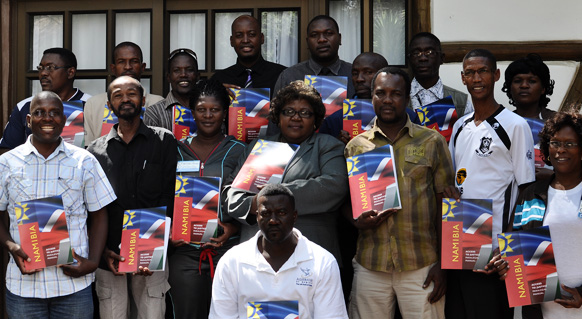The Namibian - The rule of law is not a luxury – Walters

By: NICO SMIT
ACCESS to justice in Namibia is not only a basic fundamental right, but also a means to fighting poverty, empowering the poor and ensuring that poor and underprivileged communities have the ability to seek legal remedies to situations they face.
This is according to Ombudsman John Walters, who was speaking at the launch of the new Access to Justice Paralegal Manual in Windhoek on Thursday. The manual has been produced by the Namibia Paralegal Association in cooperation with the University of Maryland in the USA, New Perimeter, the global pro bono arm of the law firm DLA Piper, and with assistance from the Legal Assistance Centre and local experts such as Nico Horn and Michael Millemann.
The manual was developed to improve understanding of certain areas of law, the kinds of challenges that people face in trying to advocate for their rights, and the strategies that can be used to address them. Walters said that with specialised training in legal literacy, insight into and greater understanding of the law, paralegals can work in their communities to give people access to the legal system. “Paralegals help people to claim their rights and in so doing can force the Government to respond to these claims,” Walters said.
According to Walters, the rule of law is not a luxury, adding that access to justice not only has strong links to democratic governance, but also to the development of strong local institutions.
Walters said although a lack of money is often the reason why many poor Namibians are unable to access the country’s justice system, one must recognise that it is only one of many barriers. Walters pointed to racial, cultural, language and demographic factors such as where people live in relation to where the courts are situated, which all hamper access to the justice system in some way. He said these factors must also be considered by paralegals as they aim to make the legal system accessible. Walters believes that paralegals not only have the capacity to mobilise for change, but also enhance the capacity of local communities to access the legal system, strengthen institutions and affect the local decision-making process.
The Ombudsman also pointed to other areas such as women’s health, law reform, and environmental issues on which paralegals can have an impact through learning local communities to think critically about the law and raise questions in this regard. However, Walters stressed that no organisation functions in isolation and that paralegals must work with other people in the legal fraternity.
Speaking from his own perspective, the Ombudsman said that he mandate of the national human rights institution is very broad and that his office needs other human rights activist organisations which have direct contact with people. This is because the office of the Ombudsman often does not have information on the problems local communities face.
The Namibian: The rule of law is not a luxury
About DLA Piper
DLA Piper is a global law firm with lawyers located in more than 40 countries throughout the Americas, Europe, the Middle East, Africa and Asia Pacific, positioning us to help clients with their legal needs around the world. In certain jurisdictions, this information may be considered attorney advertising.
About New Perimeter
New Perimeter is a nonprofit organization established by global law firm DLA Piper to provide pro bono legal assistance in under-served regions around the world to support access to justice, social and economic development and sound legal institutions. Founded in 2005 as a result of our firm’s commitment to support legal advancement worldwide, New Perimeter’s vision is to harness the skills and talents DLA Piper lawyers to further a more just world for all.
Contacts
Geneva Youel, Media Relations, DLA Piper, T. 213.330.7779
Increasing Access to Justice in Namibia
